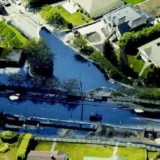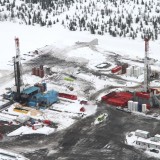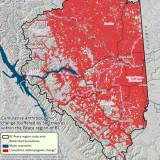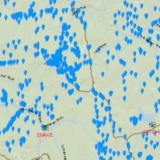Whom the gods wish to destroy, they first make mad. It looks like the gods are doing just that with the Premier and her government.
What I’ve seen the past several weeks forces me to ask, Madame Premier: Is that thing on your shoulders just for photo-ops?
For starters. Is the Kitsilano Search and Rescue Centre really a bargaining chip with the federal government over the Enbridge pipeline proposal? Do you really believe that David Black’s proposed refinery is going to make things better? That 3 pipelines carrying bitumen are safer than two?
I’ve got to say it, Premier: you don’t know a damned thing about pipelines and tankers.
Do you not understand that the rupture of a pipeline or “accident” with a tanker is mathematically inevitable? That we’re not talking risks but certainties? Your friends in the business community like to call these things “risks” in order to convince people that they’re not likely to happen. Think on this, Premier – if an accident is not going to happen, why make multimillion dollar facilities to clean them up?
The theorem is not that something can be an “acceptable risk” but that an “ongoing risk” is a certainty waiting to happen. You simply must understand this, Premier, or you are selling out the Province. As they say, shit happens.
You would have laughed, as we all would have on March 21, 2006, to think that a BC Ferry would sink, yet the following day that is just what happened.
Prior to June, 2012, we would all have scoffed at the thought that a luxury liner, on a fine day, would sink, causing several deaths and injuries.
Having agreed on that, we must assess what the damage will be. With an airplane we know that. When we get on a plane we’re betting on the odds being in our favour, but the fact that there will be crashes is a certainty. We are also prepared to concede that if our jet crashes, we’ll be dead.
If we’re to be honest, Premier, what we’re asking is not what are the odds of this happening, since we know that it will. As long as human beings are involved, there will be human error. It’s not a matter if airplanes will crash but what are the odds on it happening, say, in a month.
It is the same with pipelines and tankers – we know that these calamities are certainties but today nothing will likely happen. Even if we disagree on the odds, that doesn’t alter the fact that it will happen. We are only really calculating when or how often – the same thing an insurance company does, or we do when we bet on the odds at the race track.
Knowing the inevitable, we must now consider the consequences. It’s rather like calculating how long you can put to your head a revolver with 100 chambers and one bullet and keep pulling the chamber. You know you’ll kill yourself – the only mystery being when. If, however, you don’t put a bullet in the chamber, but marshmallow instead, you don’t care, for you won’t be hurt.
We’re not talking marshmallow here.
With oil spills and tankers, we know that the result, whenever it happens, will be hideous, catastrophic. With diluted bitumen (dilbit), there is no such thing as a small accident and you and your government must begin to understand that.
Now, to cleanup. The fact is that there is little that can be done except to the stuff you can see and access and even then very little.
I hope you know about the Enbridge “accident” in Michigan at the Kalamazoo River in July 2010. This spill was described as “not serious” by the government but it hasn’t been cleaned up yet!
Where our pipelines spill, it will not be easy to access for men and machines. Look at the proposed routes. When a spill occurs in the Rockies, the Rocky Mountain Trench, the Coast Range or the Great Bear Rainforest, how the hell are you going to get there? So you are faced with the facts that spills of dilbit are catastrophic and with our proposed pipelines you can’t get to them.
Just what makes you think that David Black’s proposed refinery will make things better?
It will be bringing bitumen from the same tar sands over the same terrain as the proposed Enbridge pipeline. The only possible plus is that instead of dumping dilbit into the ocean it will be refined oil, just like the Exxon Valdez did.
It’s been said that the Kinder Morgan line has been safe. I put this to Rex Weyler, co-founder of Greenpeace and an authority on these matters and here’s what he says:
• There have been a number of incidents related to the Trans Mountain pipeline – including the spill in Burnaby in 2007. Trans Mountain Pipeline (Kinder Morgan) pleaded guilty pleas to a 21-count indictment in B.C. Provincial Court.
• In 2009, oil spilled from Kinder Morgan’s oil Westridge terminal in Burnaby.
• There was another spill in January, 2012, near Abbotsford at Kinder Morgan’s tank farm. In that case, the National Energy Board charged that Trans Mountain Pipeline operators ignored warning alarms, spilling 90,000 litres of bitumen crude oil.
• Just a few months later, the same Abbotsford facility was home to yet another spill.
That’s 5 spills in this region in the last 6 years. There have been more – over 70 spills along the whole Trans Mountain Pipeline route since it began operation in the 1950s.
Below is an interesting video that discusses the 2007 spill, and the extreme problems with Bitumen.
Premier Clark, you owe it to your province to deal with the issues raised – not with industry slogans and bullshit, but with logic and facts. It’s getting late.





